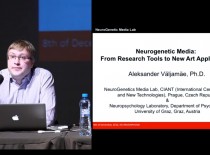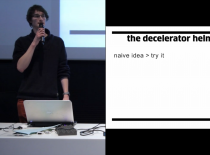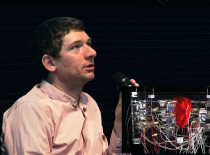Prague - December 8, 2012
Benjamin Pothier presents his paper within the panel Balance-Unbalance: Can the Arts Help to Save the World? at International conference MutaMorphosis in Prague, Czech Republic.
In this paper I will discuss the artistic direction, specific mindset and working protocols that lead to the first production phases of Maiitsoh, an interactive documentary Installation and a Network Experiment dealing with the notions of modern & traditional craft, Computer History and contemporary History and practices. It is the result of a 10 years long Research, with both theoretical and practical aspects, including a dozen of exclusive face to face interviews with Artists, Scientists, Philosophers, Zen masters and researcher, in seven different countries.
From the roots of DIY Culture, to the core of contemporary History, from Myth and Storytelling to pure. Facts, somewhere between a found objects sculpture and a Network Art experiment, Maiitsoh questions the man-machine relationship in an historical, sociological and artistic way, offering the public and users a challenging, playful, aesthetical and multimedia experience. The corpus of interviews includes one hour or more long interviews with Noam Chomsky, Fons Elders, William Gibson and Jeremy Narby, to name a few. Furthermore the Maiitsoh project works at some levels as a meta-meme, specifically in it’s particular design and ways of being exhibited that makes it an icon of the open-source culture, a statement about contemporary History and Computer History and a mindset proposal for trans-civilizational cultural production and preservation.
Adopting a syncretic approach, the perspective of my artistic and more global Research is based on a traditional Aikido sword exercise called Happo-giri , or “to cut in eight directions”. This shape got in my point of view a symbolical connection with the Buddhist wheel or Dharmachakra. I extend my perspective to contemporary practices, and in a more trans-disciplinary perspective the aims of the research is to analyse and theorize the implication (at environmental and various other level) of any industrialization and globalization of traditional and therefore “ultra local” linked practices or “habits”, and their impacts on the mental and natural environment at a planetary scale. With a focus on particular cases studies inside and outside of my personal body of work and research protocols, I will develop in this paper my personal perspectives on bi-cognitivism, ultra-locality and a contemporary look at Craftsmanship (traditional & modern) as an educational , cognitive and knowledge enhancing tool suitable for a sustainable future.
- Tags:




 Copyright © 2025 ARTISTTALK. All Rights Reserved.
Copyright © 2025 ARTISTTALK. All Rights Reserved.
0 Comments
You can be the first one to leave a comment.